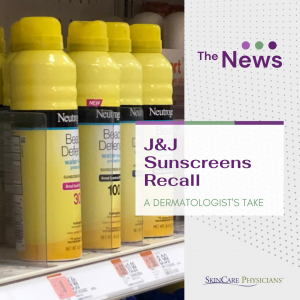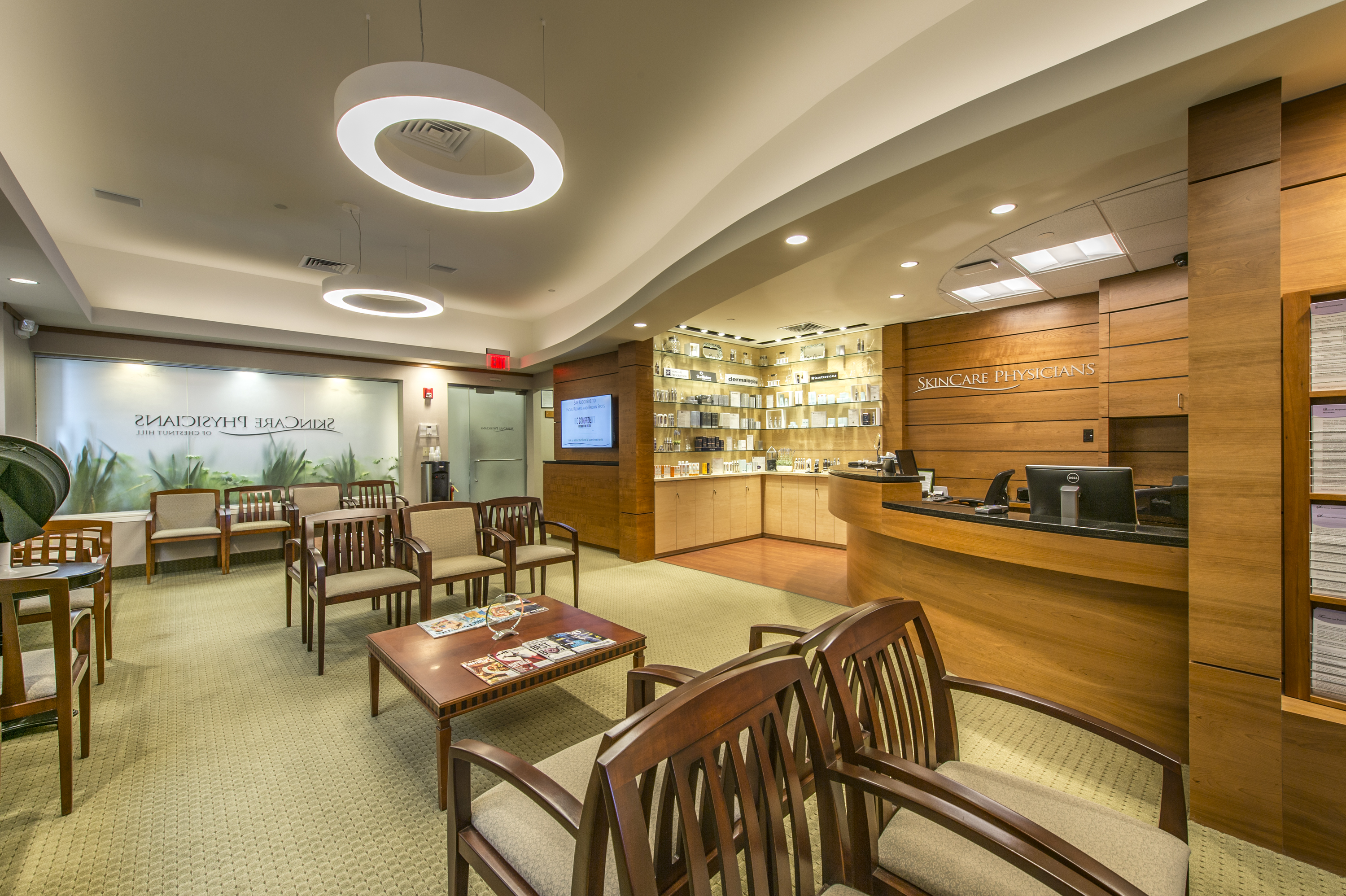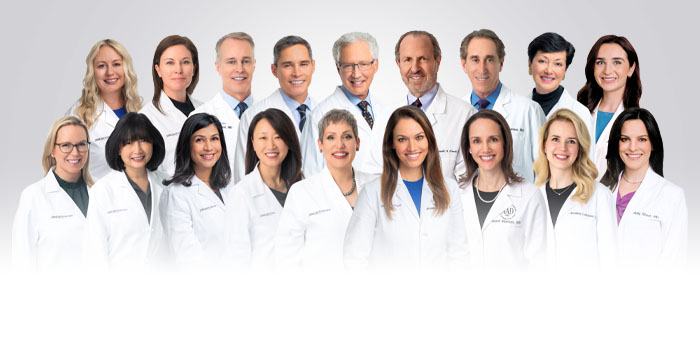A dermatologist’s take on J&J’s sunscreens recall
 You may have seen the news that Johnson & Johnson voluntarily recalled five Neutrogena and Aveeno aerosol sunscreen products. What does this mean for you? Our phone lines and inboxes are pinging with questions from our patients, so I thought I’d share my thoughts with you.
You may have seen the news that Johnson & Johnson voluntarily recalled five Neutrogena and Aveeno aerosol sunscreen products. What does this mean for you? Our phone lines and inboxes are pinging with questions from our patients, so I thought I’d share my thoughts with you.
The Johnson & Johnson recall: What you need to know
Which products have been recalled?
- Neutrogena Beach Defense aerosol sunscreen
- Neutrogena Cool Dry Sport aerosol sunscreen
- Neutrogena Invisible Daily defense aerosol sunscreen
- Neutrogena Ultra Sheer aerosol sunscreen
- Aveeno Protect + Refresh aerosol sunscreen
What should I do if I use one of these products?
- Don’t panic. Take a deep breath. Accounting for the concentration of the contaminant, exposure of typical sunscreen use and toxicology, it is not expected that any harm has occurred.
- You should stop using these specific sunscreens and appropriately discard them.
- You may contact the JJCI Consumer Care Center 24/7 with questions or to request a refund by calling 1-800-458-1673. You may report any adverse reactions to FDA’s MedWatch Voluntary Report
Why were these sunscreens recalled?
Johnson & Johnson recalled these out of an abundance of caution due to a contaminant (benzene) being detected in some samples of these sunscreens. These findings were part of a study conducted and published by Valisure a few weeks ago. Benzene is a carcinogen.
Can you tell me more about this Valisure study?
Sure, nerd! Valisure is an independent New Haven based online pharmacy that tests the pharmaceuticals and medications it sells to consumers. They conducted the studies that led to the recall of Zantac last year. They recently published findings of a study where they analyzed 294 unique sunscreen batches from 69 companies and found that about 27% of these had detectable benzene. These were mostly aerosol sprays, but some lotions too; and the affected sunscreens are mostly chemical blockers, but some physical blockers too. The current interpretation is that benzene is most likely a contaminant in the manufacturing process and not an intentional addition.
TLDR; if you’re anxious about benzene in your sunscreen, check that article from ConsumerLab which provides lists of sunscreens to avoid and sunscreens which might be safest [sign in required].
Top FAQs from my patients
I checked my sunscreen’s ingredient list and I see avobenzone. Help!
The good news: Avobenzone is not benzene. The bad news: you should still check the lists above for the name of your sunscreen if you’re anxious about this.
Am I anxious about this?
Meh. No. Let’s take a moment to think about the most commonly known carcinogens in our environment. Tobacco. Ultraviolet rays. Alcohol. Processed meat. Any of us is probably more often exposed to significant doses of one or more of these than to a contaminated sunscreen.
Let’s now take benzene. Occupational exposure to it has been associated to some leukemias, but this is in the setting of daily exposure over many years. Exposure does not mean absorption. Absorption does not mean cancer. Would it be better to reduce our exposure to benzene or any known carcinogen? Of course. Do I think you should stop using your sunscreen? If it’s on the contaminated list, why not. But will you ever reduce your exposure to zero? Nope. Not if you go to a crowded restaurant or bar with second hand smoke. Not if you go to a gas station to pump gas in your car. Or have your car window open in traffic. Or hang out near a volcano or forest fire.
In my opinion, this is clearly a product differentiation strategy for Valisure’s pharmacy. It’s marketing folks! I predict there will be more recalls from other brands in the next few weeks, as we have nothing to lose by being risk averse, but recognize that this is a study and report from a company with an agenda before panicking.
Will I get cancer if I used one of these products?
It’s unlikely. If the thought of cancer makes you anxious, harness that anxiety into action. Empower yourself by staying up to date on your recommended cancer screenings. Your primary care physician and your dermatologist are here for this very reason!
What is your advice to patients regarding these findings?
These findings are emphatically not a reason to avoid sunscreen. I generally recommend shade seeking behavior > UPF protective clothing > sunscreen (mostly physical blockers), and that recommendation stands. A few of my favorites from the “no benzene detected” list are:
- Elta MD UV Clear
- Neutrogena Pure & Free Baby
- ThinkBaby SPF 50 lotion
Use one of these and get on with enjoying your summer! We’ve certainly earned it, and I won’t let sunscreen steal my joy, benzene or no benzene.
Note: This blog was updated on June 7, 2022



Hi there,
Appreciate your article and suggestions for avoiding sunscreens contaminated with benzene. Being that it has been a year since you published this post I just wanted to check in and see if your team has had any changes of opinion in brand suggestions, products to be cautious of and/ or any other advice on the matter.
Also, it seems most of the links throughout the post are now unfortunately broken. If possible could you please provide me with a link to the list of sunscreens that do not have benzene in them? I more than appreciate your help.
Thanks very much and hope you have the sunniest day!
Cheers,
Danielle
Thank you for your comment! We have edited the post to fix the broken links. Please check the linked ConsumerLab list for specific benzene free recommendations.